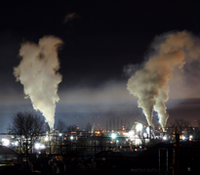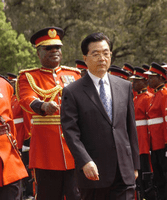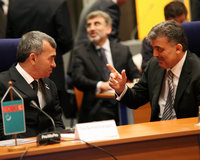In an interview with PBS’ Nightly Business Report, Saudi Arabian oilminister Ali al-Naimi talks about his country’s plans to move beyond aneconomy that is so heavily dependent on oil, and about the opening of themulti-billion dollar King Abdullah University for Science andTechnology in Thuwal, Saudi Arabia.
Resources Archive
Free Newsletter

The U.N. climate change negotiations currently underway and set to conclude in Copenhagen late in 2009 seek to establish new arrangements in anticipation of the termination of the Kyoto Protocol in 2012. According to our current understanding of the science, a successful outcome to these negotiations is critical to maintaining a stable climate, even if the estimates of the costs of damage from inaction vary widely. The negotiations are currently beset by a series of obstacles. But if these are overcome, the resulting agreement will change the global landscape in terms of trade, politics and the entire international system. The […]
U.S. Secretary of State Hillary Clinton and U.N. Secretary-General Ban Ki-Moon hosted a meeting on Global Food Security Sept. 26 in New York, with leaders from 130 countries. Ban and Clinton jointly introduced a proposal at the meeting titled “Partnering for Food Security: Moving Forward.” The thrust of the initiative is to take a more preventative and less reactive approach toward food security. “We will continue of course to invest in the crises and emergencies, but we want to begin to try to alleviate the crises and the emergencies by once again enabling people to feed themselves,” Clinton said at […]
At the TED Global Conference in Oxford, England, Parag Khanna looks atinternational borders, globalization, and how to create a prosperous,peaceful and integrated world. By looking at the “Invisible Maps”behind political borders, Khanna demonstrates how economic, demographicand cultural factors — such as Chinese migration into Russia, and theconstruction of oil and gas pipelines in the Mideast and Central Asia– are shaping the geopolitical future.

When I was in Ecuador two years ago, a businessman named Ivan excoriated me about the limits Washington placed on business that local fishing firms could do with the U.S. The conversation went on for a while, but when it ended, he promptly introduced me to his teenage daughter and pleaded with me to speak to her so that she could practice her English. In fact, she spoke eloquently and fluently, but the irony was no less striking: The gringos to the north offered little opportunity to Latin America, but the best chance for Ivan’s daughter to succeed — leaving […]

In what some experts are calling the third great wave of outsourcing — after manufacturing and services — cash-rich Arab and Asian governments are buying up arable farmland (read: water rights) all over the developing world. Naturally, the worst-case artists in my field of national security see only one possible outcome: a long, steady decline into a chaotic, Mad Max-like dystopia, characterized by that favorite of the alarmist set — resource wars. Get used to such predictions, as today’s still-stunning production inefficiencies are mechanically projected deep into the future, despite all indications of a biological revolution looming just over the […]

Less than a month after making progress on the Nabucco pipeline deal, which has now secured half of the gas needed to fill it, Turkey signed another natural gas agreement in early August that will allow access into Turkish territorial waters to the South Stream pipeline. South Stream, a Russian-Italian venture, is designed to bring Russian gas to Bulgaria while bypassing troublesome transit countries on the route between the Russian Federation and the European Union. A few days later, Turkey also held discussions with the emir of Qatar, Hamad bin Khalifa Al-Thani, on pipeline and liquefied natural gas (LNG) projects, […]
